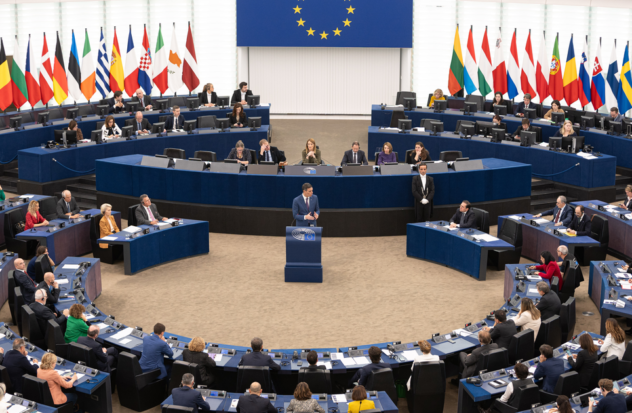“The European Union is a complex governmental organization in which the member states give up part of their sovereignty in some matters based on treaties between all the parties,” the emeritus professor of Law at the University of Lleida explained to DIARIO LAS AMÉRICAS, in Catalonia, Spain, Ferran Espaser.
In other words, “there are issues such as trade or budgetary rules that all member countries must abide by, as well as financial aid policies inside and outside the European Union, in addition to the sense of a common border and the use of currency and respect for human rights and the application of democracy as the only form of government,” he clarified.
This year the elections are held from June 6 to 9 and the number of parliamentarians is determined by the population of each Member State. For example, Malta, which is the European Union country with the smallest population, provides six delegates, while Germany, the most populated, provides 96 delegates.
Spain, the closest country to the Hispanic American continent, provides 54 MEPs this year.
All existing political parties attend the European parliamentary elections, “from the largest to the smallest, and it depends on the percentage of votes they obtain in their respective countries to obtain seats in the European Parliament,” the academic stressed.
After the elections, once the European Parliament is established, MEPs choose the president of the highest body, the European Commission, and Ursula von der Leyen is the favorite to remain in office.
The European Parliament has its main headquarters in Strasbourg, France, while the European Commission, which includes the presidency, operates in Brussels, Belgium.
Forces
Unlike the United States or other countries, where there are two, three or four major political forces, in the European Union there are at least seven, which in turn bring together nearly a hundred political parties.
MEPs are not grouped by nationality, but by political affinity. For this reason we find seven main groups, from conservatists, Christian Democrats, popular and socialists to the so-called greens and also the leftists.
For example, the Spanish Popular Party is in the Christian Democratic group, while the Spanish Socialist Workers Party is among the socialists.
Likewise, Sumar and Podemos, also from Spain, appear in the left-wing group, while VOX belongs to the conservatives.
“Yes, there is a difference between conservatists and conservatives,” recalled the emeritus law professor.
“In Europe there are different ways of dealing with political, social and economic issues,” he said.
In fact, the concept of right and left in Europe, with its centrist overtones, does not necessarily mean the same as it does in the United States.
“In Europe, a politician can call himself center-right and agree with various social programs, aid for immigrants, abortion or sex change,” he highlighted.
“The conservatists are something like the conservative wing of the Democratic Party or the less conservative wing of the Republican Party in the United States, while the Christian Democrats would also fit into the conservative wing of the Democrats and the conservatives would be the less moderate faction of the Republicans,” he said.
And the socialists? “Well, in the liberal wing of the Democrats, without being the most liberal or leftist,” he stressed.
Expectations
According to opinion polls, a shift is expected towards the more conventional or center-right wing, given by conservatives, Christian Democrats and popular ones.
“This means that socialists and leftists could lose weight in the European Parliament, and if that happens it could have an impact on relations with countries where left-wing absolutist regimes prevail, such as Cuba, Nicaragua and Venezuela,” said the academic.
Breaking off relationships “no,” he answered. “That depends on the European Council, which is made up of the presidents of member countries of the European Union, but suspending economic collaborations, as happened with Cuba a few years ago, yes, in addition to filing complaints and exposing political demands,” he added.
Spain
In the Iberian country, all political forces, more than 20, are betting on obtaining seats in the European Parliament, but very few will manage to enter the continental legislative body.
“They know that it is very important to have a voice in the European Parliament because, in addition to treaties, many important things are decided,” he maintained.
According to the survey by the Spanish firm SigmaDos, the Popular Party would add just over 35% of the votes of Spaniards, while the Spanish Socialist Workers Party would get 30%, five points behind the Populares.
The third most voted Spanish party would be VOX, which would reach almost 10% of the ballots.
Behind would be Sumar, which would obtain 7% of the ballots, while Podemos would obtain about half of these, 3.6%.
“There are groups that could not get seats on their own and end up grouping together,” he indicated.
Hence, separatist groups make up the Ahora Repúblicas group, which is made up of Esquerra Republicana de Catalunya (Catalonia), Euskal Herria Bildu (Basque Country), Galician Nationalist Bloc (Galicia) and Ara Més (Balearic Islands).
Another Spanish group that is running for the first time in the European elections is Se fin la fiesta, a right-wing group that seems to emerge from the most conservative wing of VOX and could add 2.6% of the ballots, according to this survey.



